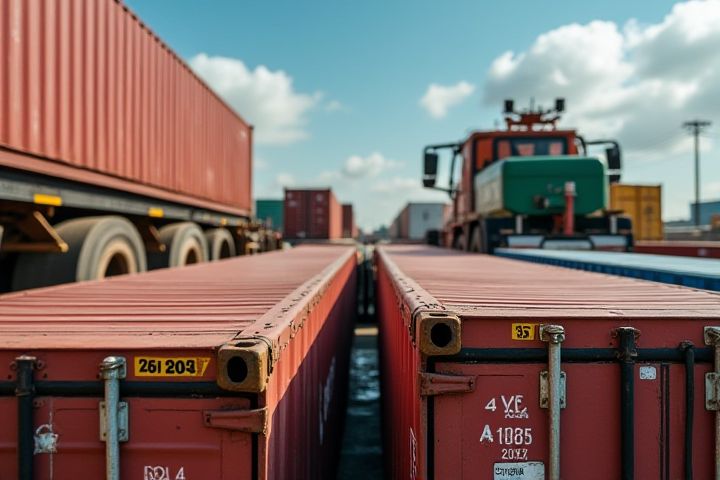
Nigeria's economy significantly relies on both import and export activities, making it a vital player in global trade. The nation predominantly exports crude oil, which accounts for approximately 90% of its total export revenue, showcasing the importance of the petroleum sector. On the import side, Nigeria mainly brings in machinery, chemicals, and food products to meet the demands of its growing population. Trade relationships with countries such as China, the United States, and India facilitate this exchange, enhancing Nigeria's economic stability. As you engage with Nigeria's market, understanding these trade dynamics can help you make informed decisions, whether you are a business owner, investor, or policy-maker.
Customs tariffs
Import and export activities in Nigeria are heavily influenced by Customs tariffs, which play a crucial role in regulating trade and protecting local industries. These tariffs can vary significantly depending on the type of goods, with specific rates designated for agricultural products, manufactured items, and raw materials. Understanding these tariffs enables businesses to navigate the complexities of international trade while optimizing costs. You should stay informed about any changes in Customs policies, as they can affect your overall import and export strategy.
NAFDAC regulations
Nigeria's import and export activities are heavily regulated by the National Agency for Food and Drug Administration and Control (NAFDAC), which ensures compliance with safety and quality standards. NAFDAC oversees the registration of food products, pharmaceuticals, cosmetics, and other goods to protect public health and safety. Importers and exporters must adhere to strict guidelines, including labeling requirements, testing protocols, and certification processes that are pivotal for market access. Understanding and navigating NAFDAC regulations is essential for anyone looking to engage in trade within Nigeria's dynamic economic landscape.
Trade agreements
Trade agreements in Nigeria significantly impact import and export activities, fostering international economic relationships. The Economic Community of West African States (ECOWAS) facilitates regional trade by promoting tariff reductions and eliminating trade barriers among member states. Nigeria's participation in the African Continental Free Trade Area (AfCFTA) aims to enhance market access, allowing your business to tap into a vast African market while benefiting from reduced tariffs on goods. Furthermore, bilateral agreements with countries like the United States encourage foreign investments, bolstering Nigeria's position as a key player in global trade dynamics.
Documentation requirements
In Nigeria, import and export documentation is crucial for compliance with customs regulations and facilitating international trade. Importers must obtain necessary permits, such as the Form M, which serves as an application for importation approval, alongside an Import Declaration Form. Exporters need to provide an Export Proforma Invoice and obtain an Export License to ensure legal shipment of goods. Accurate and complete documentation not only streamlines processes but also helps in mitigating delays at ports and ensuring adherence to trade policies.
Port infrastructure
Nigeria's port infrastructure plays a vital role in its import and export activities, acting as a gateway for international trade. The largest port, Apapa, handles a significant percentage of the nation's cargo, including petroleum, agricultural products, and manufactured goods. Upgrades to the port facilities, such as improved loading and unloading systems and enhanced security measures, are crucial for increasing efficiency and reducing turnaround times. Investing in modern port infrastructure not only improves trade capabilities but also supports economic growth and development in Nigeria.
FX restrictions
Import and export activities in Nigeria are significantly impacted by foreign exchange (FX) restrictions imposed by the Central Bank of Nigeria. These restrictions aim to stabilize the naira and control inflation, but they can create hurdles for businesses seeking to procure foreign goods or engage in international trade. Companies often face challenges in obtaining FX for essential imports, leading to delays and higher costs in the supply chain. Understanding these FX regulations is crucial for businesses to navigate the complexities of the Nigerian market and optimize their import/export strategies.
Import bans
Import bans in Nigeria are strategic policies aimed at promoting local manufacturing and reducing dependence on foreign goods. These restrictions often target specific products, such as food items and consumer goods, to encourage domestic production and protect local industries. As a result, businesses must navigate a complex regulatory environment to ensure compliance, while finding opportunities to enhance their supply chains within the local market. Understanding the implications of these import bans can significantly influence your business strategy, particularly in sectors heavily impacted by these regulations.
Export incentives
Export incentives in Nigeria are designed to promote international trade by encouraging local businesses to expand their market reach. These incentives include various financial benefits, such as tax exemptions, export credit guarantees, and grants aimed at reducing the cost of production. The Nigerian Export Promotion Council (NEPC) plays a crucial role in implementing these incentives, providing support and guidance to exporters to enhance their competitiveness. By capitalizing on these incentives, you can improve your business's profitability and contribute to the overall growth of the Nigerian economy.
Cargo inspection
Cargo inspection in Nigeria is a crucial aspect of the import and export process, ensuring compliance with regulatory standards and safety protocols. This involves thorough examinations of goods by the Nigeria Customs Service and other agencies to detect contraband and prevent smuggling. You benefit from understanding the necessity of proper documentation, such as the Clean Report of Inspection, which is required before goods can clear customs. By facilitating efficient cargo inspection, Nigeria aims to enhance trade security while fostering a conducive environment for international business.
Trade facilitation programs
Trade facilitation programs in Nigeria aim to streamline import and export processes, reducing barriers and enhancing efficiency in international trade. Key initiatives include the implementation of Single Window platforms and the establishment of Trade Hubs, which provide businesses with essential resources and support. These programs promote transparency and reduce customs clearance times, allowing for smoother transitions of goods across borders. Engaging in Nigeria's trade facilitation efforts can help you optimize your supply chain and increase competitiveness in the global market.
